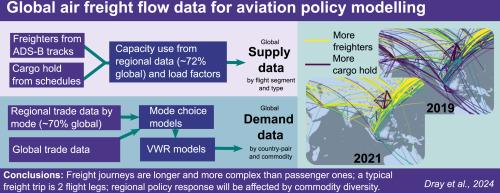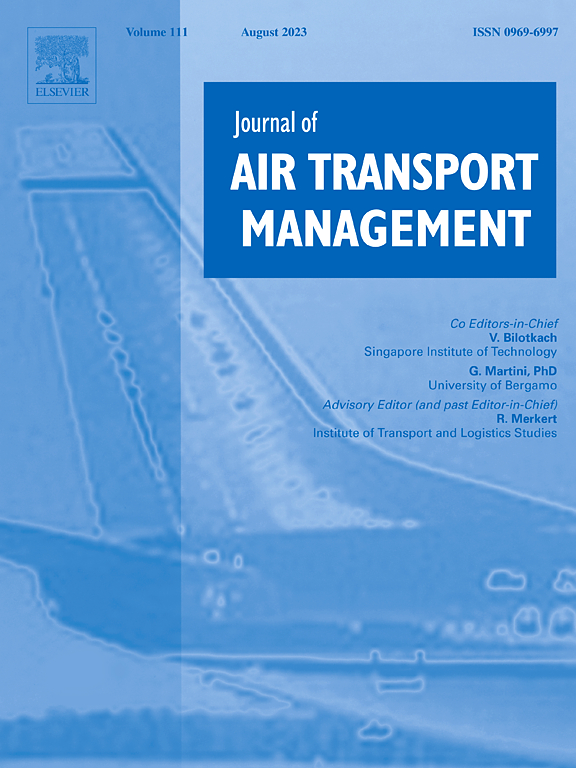用于航空政策建模的全球航空货运流量数据
IF 3.9
2区 工程技术
Q2 TRANSPORTATION
引用次数: 0
摘要
航空货运模型往往受制于可用数据的缺乏。本研究汇集了不同来源的航空货运供需数据,以弥补这一不足。为了研究航空货运业务,我们将航班时刻表、航班跟踪数据和国家级客货运数据库结合起来,得出了 2019-2021 年全球航班分段运力、货机载运率和客舱载运率的估计值。为了研究真正的始发地-最终目的地航空货运需求,我们开发了 2019 年按商品类别划分的货运模式选择模型,以填补国际和国家贸易数据集中模式信息的空白,并对 2019 年和 2021 年进行了估算。供需数据的初步比较表明,航空货运旅程与客运旅程有很大不同,通常包括更多的飞行航段(大致为 2 段左右,而客运为 1.2 段)和更长的航段距离(平均客运距离的 2.2-2.5 倍),进出各个国家和地区的商品流量和业务量存在很大的不对称性。尽管 COVID-19 引发了更多货运飞机的空运转变,但这些差异在 2021 年依然存在。这项研究迈出了第一步,为按商品估算的全球航空货运流量提供了一个综合数据库。本文章由计算机程序翻译,如有差异,请以英文原文为准。

Global air freight flow data for aviation policy modelling
Models of air freight are often constrained by a lack of available data. This study brings together different sources of air freight supply and demand data to address this gap. To study air freight operations, we combine schedules, flight tracking data and country-level databases of passenger and freight movements to produce estimates of global flight segment-level capacity and load factors in freighter aircraft and passenger holds for 2019–2021. To study true origin-ultimate destination air freight demand, a freight mode choice model by commodity group is developed for 2019 to fill gaps in mode information in international and national trade datasets, and estimates are made for 2019 and 2021. Initial comparisons of supply and demand data demonstrate that air freight journeys differ significantly from passenger journeys, typically including more flight legs (roughly, around 2, compared to 1.2 for passengers) and greater leg distances (2.2–2.5 times average passenger distance), with significant asymmetry in commodity flows and operations to and from individual countries and regions. These differences persist in 2021, despite COVID-19 induced shifts towards carrying more air freight in freighter aircraft. This research forms a first step towards making available an integrated database of estimated global air freight flows by commodity.
求助全文
通过发布文献求助,成功后即可免费获取论文全文。
去求助
来源期刊

Journal of Air Transport Management
TRANSPORTATION-
CiteScore
12.40
自引率
11.70%
发文量
97
期刊介绍:
The Journal of Air Transport Management (JATM) sets out to address, through high quality research articles and authoritative commentary, the major economic, management and policy issues facing the air transport industry today. It offers practitioners and academics an international and dynamic forum for analysis and discussion of these issues, linking research and practice and stimulating interaction between the two. The refereed papers in the journal cover all the major sectors of the industry (airlines, airports, air traffic management) as well as related areas such as tourism management and logistics. Papers are blind reviewed, normally by two referees, chosen for their specialist knowledge. The journal provides independent, original and rigorous analysis in the areas of: • Policy, regulation and law • Strategy • Operations • Marketing • Economics and finance • Sustainability
 求助内容:
求助内容: 应助结果提醒方式:
应助结果提醒方式:


